SAFE SCHOOLS = SAFE FUTURE
One of the most critical gaps in ensuring that children and schools remain safe is lack of access to water, sanitation and hygiene (WASH) programs. More than half of Liberian schools lack access to a functional source of water and more than 40% lack access to any form of sanitation infrastructure. The situation in Rivercess County, where our operations are focused, is even more dire.
One March 2, 2015, schools throughout Liberia reopened after having been closed for more than seven months due to the Ebola outbreak. FACE Africa partnered with USAID, the Liberian Ministry of Education, UNICEF and Global Communities to provide schools with the supplies, support and safety protocol training they so badly need as students return to their studies. As part of these efforts, we worked across Rivercess County to distribute health and hygiene supplies to schools, to provide promotion and awareness materials, and to establish and train School Health Safety Committees and Fever Monitoring teams. This includes working closely with teachers and school principles, but also PTA and local community members.
UN air drop of hygiene kits for distribution to schools [photo: Keiko Hiromi for FACE Africa]
Temperature Checking Protocols [photo: Keiko Hiromi for FACE Africa]
WASH: THE FIRST STEP TO RECOVERY
Taking the lead in Rivercess County, FACE Africa is working as part of the WASH in Schools (WinS) Initiative that aims to improve the future of children across Liberia. The Liberian Government has identified improving WASH provision in schools as the first step to recovery from Ebola. Most of the nation's school lack access to a water supply, basic sanitation infrastructure or hygiene awareness materials, thereby preventing schoolchildren from remaining healthy and receiving the education they need to thrive.
FACE Africa's first target has been Rivercess County's Central C1 Education District, where only 9 of the district's 26 schools had access to safe water before the launch of our initiative. We have so far completed 5 additional safe water points, and are stepping up our efforts to ensure that the remainder of the district's 2,300 students gain access to safe water for drinking, cleaning, hand washing and hygiene purposes. Over the next few months, FACE Africa will also be working with the county's education authorities to conduct a comprehensive WASH assessment of all other education districts, with the eventual aim of rolling out our initiative throughout the county.
In February 2015 as part of our Back to School Initiative, FACE Africa completed construction of a new safe water point at Yarpah's Town Public School, which had previously lacked access to its own source of water. Following the reopening of schools across the country on 1 March 2015, this means that the children at this school will have a nearby source of drinking water and that school staff have the water needed to ensure the implementation of proper hygiene and hand-washing protocols to help keep children and their communities safe.
Classes have resumed at the Yarpah's Town Public School, Rivercess County, Liberia
Learning the importance of hygiene in disease prevention
Hand washing as part of our Safe Schools Protocols


![UN air drop of hygiene kits for distribution to schools [photo: Keiko Hiromi for FACE Africa]](https://images.squarespace-cdn.com/content/v1/562d0761e4b0057d8f9d5316/1449433892054-BSY3ALTQCFZTZQGRB2QT/IMG_2202.JPG)
![Temperature Checking Protocols [photo: Keiko Hiromi for FACE Africa]](https://images.squarespace-cdn.com/content/v1/562d0761e4b0057d8f9d5316/1449434240995-I779Z34RMOKG0PB887M5/image-asset.jpeg)


